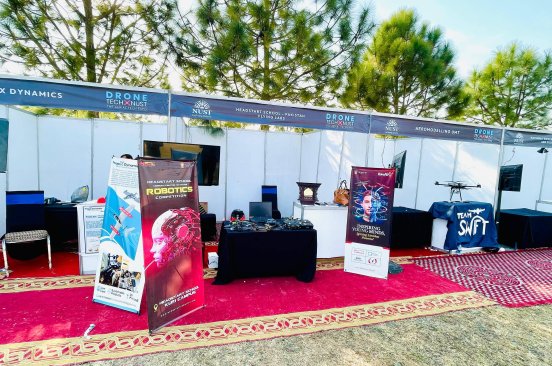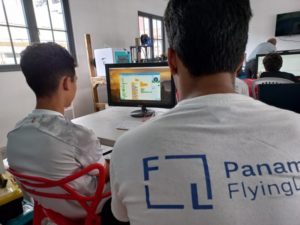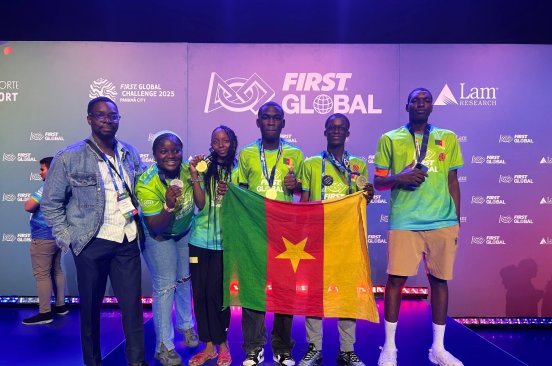
Panama Flying Labs Dota a Los Niños de Superpoderes Mediante La Educación Tecnológica
Los participantes se familiarizaron con la robótica y la automatización y descubrieron también cómo pueden aplicarse a diversos proyectos personales.
November 8th, 2023
Enseñar es algo más que guiar a los alumnos en la resolución de problemas; se trata de dotarles de superpoderes. Cuando enseñamos tecnología, nos aseguramos de que no sólo nos haga la vida más fácil, sino que también transforme la vida de los demás. Mediante este proceso, dotamos a las mentes jóvenes de las herramientas que necesitan para labrarse un futuro prometedor, basado en proyectos del mundo real que abordan problemas de sus comunidades. Enseñar es llevar esperanza donde no la hay; es ofrecer oportunidades donde nadie ve prosperidad.
El curso de verano Python desde Cero
Como ya sabemos, en los próximos años, el acceso a la tecnología punta, como las herramientas avanzadas de automatización informática y la robótica, estará cada vez más al alcance de cualquier persona con un ordenador o conexión a Internet. Esto significa que las habilidades necesarias para que las generaciones futuras prosperen en este entorno deberán actualizarse en consecuencia.
En respuesta a esto, Panama Flying Labs organizó el curso de verano "Python desde Cero", celebrado en La Manzana de El Casco Viejo de Ciudad de Panamá (Panamá). El curso estaba dirigido a niños de 9 a 12 años y tuvo lugar del 10 al 23 de enero, con dos sesiones por semana. El éxito del curso fue posible gracias al apoyo de los estudiantes de ingeniería eléctrica de la Universidad Tecnológica de Panamá. Recibimos equipo de cómputo del Centro de Manufactura para la Innovación Tecnológica (FAB LAB UTP), y Panamá Flying Labs (COBOTS Lab) proporcionó el equipo de vuelo de drones. Las clases fueron coordinadas y ejecutadas en conjunto con el Dr. Humberto Rodríguez, investigador y profesor de la Universidad Tecnológica de Panamá.
Estructura del curso
El curso se estructuró en tres partes.
- Explorando Python con Raspberry Pi 400: La aventura comenzó con la programación en Python utilizando Raspberry Pi 400, un miniordenador con pines para módulos de sensores. Un juego intuitivo desarrollado en Python ilustró a los participantes su potencial para desarrollar soluciones tecnológicas.
- Pensamiento algorítmico con Scratch: Los alumnos se adentraron en el pensamiento algorítmico a través de la programación por bloques utilizando Scratch en la Raspberry Pi 400. Aprendieron conceptos fundamentales de programación como operadores matemáticos, variables, funciones, flujo de control y resolución de problemas.
- Proyectos prácticos: Para evaluar su aprendizaje, se encargó a los alumnos que crearan miniproyectos utilizando variables, funciones y flujos de control en Python. Estos proyectos iban desde el dibujo de figuras geométricas hasta el desarrollo de trayectorias para robots móviles y drones, simulando misiones de rescate. Cada estudiante recibió una Raspberry Pi 400, que facilitó su aprendizaje al proporcionar suficiente RAM y memoria para ejecutar tanto Scratch como Python y permitir la administración remota a través de SSH.
Prepararse para la evolución del panorama tecnológico
 Los participantes en "Python desde Cero" no sólo se familiarizaron con la robótica y la automatización, sino que también descubrieron cómo pueden aplicarse estas herramientas de programación a diversos proyectos personales. Se les expusieron posibles trayectorias profesionales en programación y robótica, competencias esenciales para las próximas revoluciones tecnológicas. Además, enseñarles lenguajes como Scratch y Python les introdujo en conceptos esenciales en la programación informática moderna, como la programación orientada a objetos, las condiciones y los operadores. La experiencia práctica con Raspberry Pi y otros dispositivos les proporcionó conocimientos prácticos aplicables a sectores como la robótica, la electrónica y la ingeniería. Está claro que cursos como éste fomentan la creatividad, la resolución de problemas y la innovación, atributos fundamentales para triunfar en el panorama tecnológico actual, en rápida evolución.
Los participantes en "Python desde Cero" no sólo se familiarizaron con la robótica y la automatización, sino que también descubrieron cómo pueden aplicarse estas herramientas de programación a diversos proyectos personales. Se les expusieron posibles trayectorias profesionales en programación y robótica, competencias esenciales para las próximas revoluciones tecnológicas. Además, enseñarles lenguajes como Scratch y Python les introdujo en conceptos esenciales en la programación informática moderna, como la programación orientada a objetos, las condiciones y los operadores. La experiencia práctica con Raspberry Pi y otros dispositivos les proporcionó conocimientos prácticos aplicables a sectores como la robótica, la electrónica y la ingeniería. Está claro que cursos como éste fomentan la creatividad, la resolución de problemas y la innovación, atributos fundamentales para triunfar en el panorama tecnológico actual, en rápida evolución.
Observaciones significativas del curso
Una de nuestras principales conclusiones durante el curso es que existe un interés creciente entre padres, instituciones, empresas y fundaciones por invertir en la educación y el desarrollo de las generaciones futuras. Este compromiso subraya la importancia de dotar a las mentes jóvenes de las habilidades necesarias para navegar por el futuro impulsado por la tecnología.
Otra observación digna de mención fue el importante papel que desempeñan las películas de ciencia ficción y los programas de televisión a la hora de estimular la imaginación y la creatividad de los niños. A lo largo del curso, muchos alumnos sacaron analogías de medios populares de ciencia ficción para profundizar su comprensión de los conceptos que se enseñaban.
En conclusión, el curso "Python desde Cero" demostró el valor de alimentar la curiosidad de los niños mediante la educación tecnológica. Fue un ejemplo de cómo la educación tecnológica puede ser una fuerza transformadora, preparando a las mentes jóvenes para los retos y oportunidades del mundo del mañana.
Chequea el video en Instagram >>
———————
Por José Simmonds, estudiante de Tercer Año de Ingeniería Electromecánica
Teaching is more than just guiding students through problem solving; it is about endowing students with superpowers. When we teach technology, we ensure that it does not only make our lives easier but also transforms the lives of others. Through this process, we equip young minds with the tools they need to navigate a promising future, grounded in real-world projects that address issues in their communities. To teach is to bring hope where there is none; it is to provide opportunities where no one sees prosperity.
The Python desde Cero summer course
As we already know, in the coming years, access to cutting-edge technology such as advanced computer automation tools and robotics will be increasingly available to anyone with a computer or internet connection. This means that the skills needed for future generations to thrive in this environment will need to be updated accordingly.
Responding to this, Panama Flying Labs organised the summer course "Python desde Cero", held at La Manzana in El Casco Viejo in Panama City, Panama. The course was aimed at children aged 9 to 12 years old and took place from 10th to 23rd January, with two sessions per week. The success of the course was made possible thanks to the support of the electrical engineering students of the Technological University of Panama. We received computer equipment from the Manufacturing Center for Technological Innovation (FAB LAB UTP), and Panama Flying Labs (COBOTS Lab) provided the drone flight equipment. The classes were coordinated and executed in conjunction with Dr. Humberto Rodriguez, researcher and professor at the Technological University of Panama.
The course structure
The course was structured in three parts.
- Exploring Python with Raspberry Pi 400: The adventure began with Python programming using Raspberry Pi 400, a minicomputer with pins for sensor modules. An intuitive game developed in Python illustrated to the participants its potential for developing technological solutions.
- Algorithmic thinking with Scratch: The learners delved into algorithmic thinking through block programming using Scratch on the Raspberry Pi 400. They learned fundamental programming concepts such as mathematical operators, variables, functions, control flow, and problem-solving.
- Hands-on projects: To assess their learning, students were tasked with creating mini-projects using variables, functions, and control flows in Python. These projects ranged from drawing geometric figures to developing trajectories for mobile robots and drones, simulating rescue missions. Each student received a Raspberry Pi 400, which facilitated their learning by providing enough RAM and memory to run both Scratch and Python and allowing remote administration via SSH.
Preparing for the evolving technological landscape
 Participants in "Python desde Cero" not only gained familiarity with robotics and automation but also discovered how these programming tools can be applied to various personal projects. They were exposed to potential career paths in programming and robotics, which are essential skills for the next technological revolutions. Additionally, teaching them languages like Scratch and Python introduced them to concepts that are essential in modern computer programming, such as object-oriented programming, conditions, and operators. The hands-on experience with Raspberry Pi and other devices provided practical skills applicable across industries like robotics, electronics, and engineering. It is clear that courses such as this one foster creativity, problem-solving, and innovation, all of which are critical attributes for success in today's rapidly evolving technological landscape.
Participants in "Python desde Cero" not only gained familiarity with robotics and automation but also discovered how these programming tools can be applied to various personal projects. They were exposed to potential career paths in programming and robotics, which are essential skills for the next technological revolutions. Additionally, teaching them languages like Scratch and Python introduced them to concepts that are essential in modern computer programming, such as object-oriented programming, conditions, and operators. The hands-on experience with Raspberry Pi and other devices provided practical skills applicable across industries like robotics, electronics, and engineering. It is clear that courses such as this one foster creativity, problem-solving, and innovation, all of which are critical attributes for success in today's rapidly evolving technological landscape.
Significant observations from the course
One of our key findings during the course is that there is a growing interest among parents, institutions, companies, and foundations in investing in the education and development of future generations. This commitment underscores the importance of equipping young minds with the skills needed to navigate the technology-driven future.
Another noteworthy observation was the important role that science fiction movies and television shows play in stimulating children's imagination and creativity. Throughout the course, many students drew analogies from popular science fiction media to deepen their understanding of the concepts being taught.
To conclude, the "Python desde Cero" course was proof of the value of nurturing children’s curiosity through technology education. It exemplified how technology education can be a transformative force, preparing young minds for the challenges and opportunities of tomorrow's world.
Check out the video on Instagram >>
———————
By Jose Simmonds, a third-year Electromechanical Engineering student
Category(s)
Location(s)
Recent Articles
View All »

Team Cameroon's Road to Victory at the First Global Robotics Competition 2025
